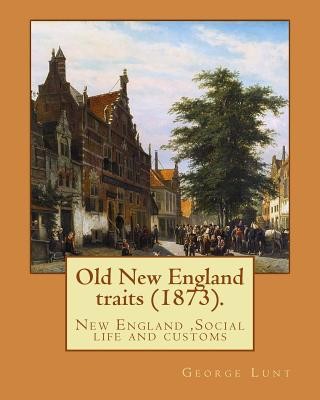
- We will send in 10–14 business days.
- Author: George Lunt
- Publisher: CreateSpace Independent Publishing Platform
- ISBN-10: 1543064531
- ISBN-13: 9781543064537
- Format: 20.3 x 25.4 x 0.4 cm, softcover
- Language: English
- SAVE -10% with code: EXTRA
Reviews
Description
George Lunt (December 31, 1803 - May 17, 1885) was an American editor, lawyer, author, and politician. George's ancestor, Henry Lunt, was one of the original settlers of Newbury (1635). His grandfather's exploits with John Paul Jones were chronicled by James Fenimore Cooper. Life: George Lunt was born in Newburyport, Massachusetts on December 31, 1803. He attended Phillips Exeter Academy.He was graduated at Harvard College in 1824, with special distinction in Greek, studied law, and began practice in Newburyport in 1827. In earlier life Mr. Lunt was an active member of the Whig party, and in its interests was distinguished as a public speaker. On the dissolution of that party he became a Democrat. He was elected successively representative for Newburyport and senator from Essex County in the legislature, was an active member of the convention that nominated General Zachary Taylor for the presidency, and was appointed United States District Attorney for Massachusetts under Taylor's administration. He eventually resumed the private practice of his profession, devoting his leisure to literary pursuits. When the Whigs dissolved, he joined the Democrats. Prior to and during the Civil War he was editor of the Boston Courier in conjunction with George S. Hillard. He opposed policies which would estrange the South and defended slavery.When he returned to the practice of his profession, he appeared frequently in the state courts, and was counsel before congressional committees in reference to French claims, preparing a bill and efficiently pressing it for the action of congress. Mr. Lunt's later years were marked by labors in behalf of harbors of refuge, notably at Scituate, Massachusetts, on the south shore of Boston bay. By persevering effort he succeeded in securing very considerable appropriations from congress to this end. He was a man of firm convictions in both political and religious matters, and fearless and manly in their expression. As a writer his style was marked by strength, dignity, and grace. Lunt died in Boston on May 17, 1885.
- Author: George Lunt
- Publisher: CreateSpace Independent Publishing Platform
- ISBN-10: 1543064531
- ISBN-13: 9781543064537
- Format: 20.3 x 25.4 x 0.4 cm, softcover
- Language: English English
George Lunt (December 31, 1803 - May 17, 1885) was an American editor, lawyer, author, and politician. George's ancestor, Henry Lunt, was one of the original settlers of Newbury (1635). His grandfather's exploits with John Paul Jones were chronicled by James Fenimore Cooper. Life: George Lunt was born in Newburyport, Massachusetts on December 31, 1803. He attended Phillips Exeter Academy.He was graduated at Harvard College in 1824, with special distinction in Greek, studied law, and began practice in Newburyport in 1827. In earlier life Mr. Lunt was an active member of the Whig party, and in its interests was distinguished as a public speaker. On the dissolution of that party he became a Democrat. He was elected successively representative for Newburyport and senator from Essex County in the legislature, was an active member of the convention that nominated General Zachary Taylor for the presidency, and was appointed United States District Attorney for Massachusetts under Taylor's administration. He eventually resumed the private practice of his profession, devoting his leisure to literary pursuits. When the Whigs dissolved, he joined the Democrats. Prior to and during the Civil War he was editor of the Boston Courier in conjunction with George S. Hillard. He opposed policies which would estrange the South and defended slavery.When he returned to the practice of his profession, he appeared frequently in the state courts, and was counsel before congressional committees in reference to French claims, preparing a bill and efficiently pressing it for the action of congress. Mr. Lunt's later years were marked by labors in behalf of harbors of refuge, notably at Scituate, Massachusetts, on the south shore of Boston bay. By persevering effort he succeeded in securing very considerable appropriations from congress to this end. He was a man of firm convictions in both political and religious matters, and fearless and manly in their expression. As a writer his style was marked by strength, dignity, and grace. Lunt died in Boston on May 17, 1885.


Reviews